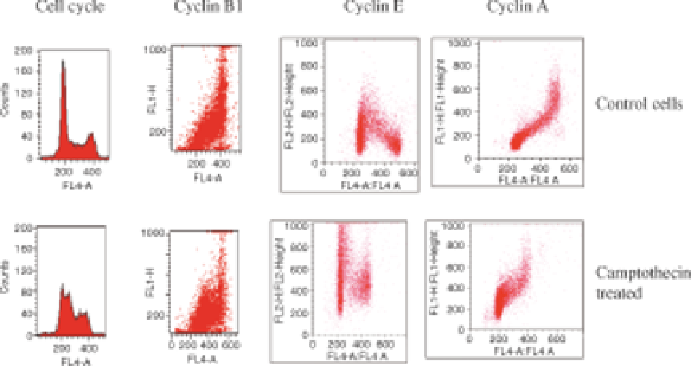Biomedical Engineering Reference
In-Depth Information
FIGURE 5.8
Cell Cycle and cyclin profiles on cells after Camptothecin treatment.
that these activities provide can be at the level of arrest and/or movement into
apoptosis cascades. It is possible to more accurately monitor these activities by
including additional parameters capable of being evaluated by flow cytometry.
5.3.1 Arrest
Cell cycle arrest is an activity defined as a pronounced slowdown in traverse times or a
stop condition for cells in their movement between one phase and the next during
cycle proliferation steps. Arrest can be the end point of a differentiation mechanism,
as happens to lymphocytes, which will stay in the G
0
phase of the cycle until specific
activation signals can move them into cycling (proliferating) again. Arrest can also be
induced by stress or damaging agents, where a slowdown in proliferation will allow
cells the time to cope with such a stress condition or repair any damage by activating
repair mechanisms that address the insult. Arrest at a specific phase of the cycle can be
in place for extensive periods of time, as it usually happens with lymphocytes in G
0
phase of the cycle, or for shorter periods of time, as it happens in most situations of
drug-induced arrest at G
2
/M phase.
Escape from phase-specific arrest can be the result of either recovery or break-
through of the block that continues down the path toward death by activation of
apoptotic cascades. Arrest is usually evaluated with flow cytometry by looking at the
population distribution changes obtained from cell cycle profiles, but these observa-
tions provide only a limited interpretation of compounds undergoing evaluation.
Simultaneous measurements of other proteins actively controlling the cell cycle
traverse times (such as cyclins and certain phosphoproteins) can provide further
interpretation of specific mechanisms of action involved in the process when these
components are measured simultaneously in cells trapped at specific phase of the
cell cycle.

Search WWH ::

Custom Search